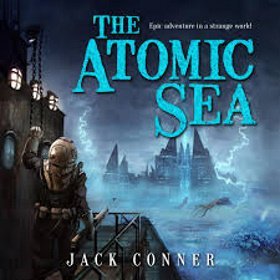by Jack Conner
Copyright 2015
All rights reserved
Cover
image used with permission
FREE GIFT:
To claim your FREE Jack Conner Starter Library, which includes four whole free novels, sign up for my newsletter here: http://jackconnerbooks.com/newsletter/
The World of the Atomic Sea

For a larger version of the map, go to:
http://jackconnerbooks.com/map-of-the-world-of-the-atomic-sea
Chapter 1
“Papa, why are they all looking at us?”
Avery had been wondering the same thing. And they were looking at the group from the Verignun, there could be no doubt. From balconies overhanging the bazaar and alleys snaking off it they looked. From market stalls and street corners. Not all of them, really only a small percent, but the watchers were there, and there was something purposeful about the way they observed the group from the whaling ship, something that made the hairs on the back of Avery’s neck stand up.
“Because we’re outsiders,” he said, not wanting to ruin the day for his daughter. She’d been looking forward to port in the way that only children can anticipate something. But in the city of Ethali, the residents would see many outsiders, and there was nothing particularly strange or unusual about the party from the Verignun—outwardly, anyway.
Layanna strode at Avery’s side, her deep blue eyes drinking in the colorful chaos, blond hair flashing in the sun. Though seeming to enjoy it, a trace of concern dimpled the area between her brows.
“Anything we should be worried about?” he asked her, careful to keep his voice low.
She only shook her head, not in a No, he understood, but in an I don’t know. Around them vendors enthusiastically hawked their wares—fish and other creatures from the sea, but also spices, rum, goods from ports even more exotic than this, salvage, cotton, disease-free cattle, stamps, currency, books, art. The Verignun had docked so her crew could sell the pitiful amount of whale flesh they’d been able to harvest (after already collecting the hot lard) and purchase food and supplies, in this case for the return leg of their journey. The Verignun had reached the outer edge of her months-long voyage and was ready to set sights on home once again.
Ani threw off her momentary worry and ran to a nearby stall selling obviously-diseased snapfish. The specimens glistened sickly in their bins, and Avery called out for her not to touch any.
“Eww!” she said, squealing in delight as one of the fish, somehow still alive, squirmed and snapped its primary mouth at her; it had many others located in miniature at the end of each writhing tendril, which sprouted liberally along its slimy length. It was weak and Ani wasn’t in danger at all, so she bent down to observe something about its head that interested her.
“It’s got a pincer for a tongue, Papa!” she reported brightly. “It’s blue!”
This didn’t surprise Avery. Some of the other snapfish had milky blind eyes sprouting from their tendrils—eyes which snapfish did not normally have—or secreted a brown fluid from their gills. Even mutant breeds could mutate.
“Why haven’t these fish been processed?” Avery asked of the vendor, a hulking infected fellow with octopus-like skin and air-bladders growing under his arms.
“Some folk like ‘em better this way,” the man said, spitting to the side and revealing that instead of teeth he possessed yellowing beak-like protrusions jutting from his gums, chipped and scored and looking capable of breaking bone with a single snap. The beaks were discolored by the juice of the hili seed, which many of the locals chewed. “Some think they taste better,” he added. “I know I do.”
“As a doctor, I feel compelled to warn you that—”
“May I help you, hon?” the man asked Layanna, interrupting Avery.
Her eyes had brightened at the morbidly-squirming fish, and Avery was afraid she might buy one of the things from the vendor and eat it raw right there in front of everybody, but fortunately he was spared that sight again today.
“Not at the moment,” she said, and the vendor shrugged as if to say Your loss.
“Interesting port, isn’t it?” she said as the whaling party continued on.

























